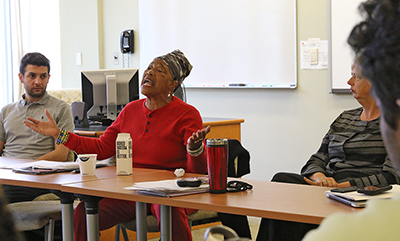In the Classroom: Amid Trauma, ‘Finding Their Own Voice’.
 “Women are fabulous,” said theater performance artist Rhodessa Jones to students on a recent afternoon at the School of Public Health. “When I think about all of the stories I’ve heard from women and see they’re still standing—they’re just fabulous.”
“Women are fabulous,” said theater performance artist Rhodessa Jones to students on a recent afternoon at the School of Public Health. “When I think about all of the stories I’ve heard from women and see they’re still standing—they’re just fabulous.”
These stories—painful recollections of neglect, sex trafficking, discrimination, substance misuse, and more—represent chapters in the life narratives of women who have participated in Jones’ San Francisco–based performance workshop, The Medea Project: Theater for Incarcerated Women. As the Activist Lab’s artist-in-residence, sponsored by the BU Arts Initiative and part of SPH’s suite of 400 Years of Inequality events, Jones led four days of storytelling sessions and performances from the workshop from October 15-18.
Between performances at SPH, Jones took time to visit students in the Trauma, Trauma-Informed Care, Recovery & Resilience class taught by Carol Dolan, clinical associate professor of community health sciences. The course examines ways that trauma can affect physical and mental health, and interventions that promote recovery and resilience.
In an intimate and candid conversation, Jones spoke with students about her personal and professional experiences in dealing with—and talking openly about—trauma and pain, and how she uses storytelling as a means of empowering women to heal and grow from their traumatic experiences.
“When we talk about trauma, it hits me,” Jones said. She shared stories about her grandmother and mother growing up as African Americans in the post-Civil War South, where they were forced to watch lynchings and castrations of family members and neighbors.
“My mother’s first husband was lynched,” said Jones. “I always wonder how she survived and healed.” Jones said her mother was a gracious person who “always wanted to know people’s stories. She would ask everyone she met, ‘Who are you and where are you from?’”
A former dancer, Jones said The Medea Project was born out of an opportunity she had more than three decades ago teaching aerobics to women in county jails. She quickly tapped into their anger, pain, and helplessness, and formed the project as a nonjudgmental outlet for women to release their feelings and share their experiences through personal stories, music, art, or any creative vehicle that represents their narrative.
“My life has been rooted in helping incarcerated women save their own lives through the creative process,” Jones told the class. Many of the women in the project have recounted stories about being kidnapped or gang-raped, traumatic experiences that then lead to a life of drugs and crime to mask the pain. “It’s important that they find their own voice and tell their own stories.”
Some women open up easily, Jones said, but others are confrontational or hesitant to share raw details of their lives. “The women who pretend they don’t care, they’re the ones that are holding in a lot,” Jones said. “They’re also the artists. Once you open them up, they are the creative forces.”
MPH student Erika Lozano ask how one would measure the quantitative impact of art as a form of healing. “Doing public health research, a lot of questions are raised about how we measure the impact of this type of work,” Lozano said. “How are you able to measure that what you’re doing is physiologically and mentally helping people?”
Simple, said Jones: intuition and human connection.
“I know this is a scientific place, but I’ve been doing this work for almost 50 years, and I know when my heart is open and when it is full.” She said her work is validated when she runs into past participants on the street who thank her for helping them find their purpose, sobriety, or other post-incarceration goals. “There’s a lot of human work that has to happen. I’m glad I’m a part of the force that found that art and storytelling was just as vital as science.”
“How do you do this work without getting overwhelmed and burnt out?” asked MPH student Olivia Ferris.
Jones said her work is complex, taxing, and scary, especially at a time when, she says, “more women are going to jail than ever.” But she maintains a sense of gratitude and hope—and incorporates dancing, massages, and family time into her life.
“We’re all human beings. We cry, we let it out, and then we say, ‘Well, what are we going to do next?’” said Jones. “And now I’m here, talking to you all, who are part of the next generation of people who will do this work.”
“Rhodessa Jones’ visit to class was a powerful living example of the way in which art, specifically dramatic performance of people’s lived experience, can aid in healing, in establishing community, and in building resilience,” Dolan said after the class. “Public health students can benefit by ‘thinking outside of the box’ when working with populations who have experienced trauma.”